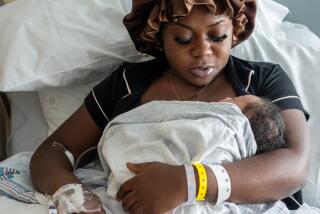A struggling girl
- Share via
TANYA COLLINS knew little about King/Drew when she moved to Los Angeles in the eighth month of her third pregnancy. A friend referred her to the Hubert H. Humphrey Comprehensive Health Center, a county-run clinic affiliated with the hospital.
Early on June 28, 2000, Collins’ water broke, nine days after her due date. She rushed to King/Drew. For the next 15 hours, she was given medication to induce labor and intermittently had severe pain.
When it became clear the baby wasn’t getting enough oxygen, about 8:15 p.m., doctors ordered an emergency caesarean. The procedure wasn’t performed for more than an hour and a half, according to an analysis of the case by lawyers for the county.
“I kept begging them to take the baby,” Collins said.
At the time of her birth, Lauryn Johnson was noted to be “non-responsive, floppy and without signs of breathing,” the county lawyers’ analysis said.
The county paid Lauryn and her family $2.5 million, the largest settlement involving King/Drew in at least five years. Under state law, injured patients who live often are eligible to receive far more than the families of those who die because of the costs of ongoing medical care.
The delayed C-section caused some developmental delays, the county and the family agree. In her first months, Lauryn suffered regular seizures. She drooled uncontrollably.
Today, Lauryn, who lives with her family in Greenville, Texas, is doing better. Still, the 4-year-old’s speech is slurred and she has trouble remembering her alphabet and colors. She can’t lift her arms to put her shirt over her head.
“She’s coming along,” said Lauryn’s great-grandmother, Flora Collins, “but it’s slow. She’s slow.”
More to Read
Sign up for Essential California
The most important California stories and recommendations in your inbox every morning.
You may occasionally receive promotional content from the Los Angeles Times.













